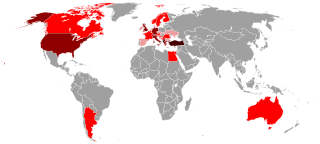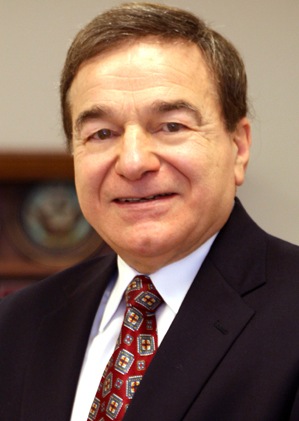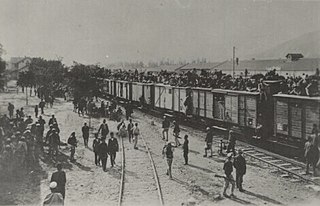
The Albanians are an ethnic group native to the Balkan Peninsula who share a common Albanian ancestry, culture, history and language. They primarily live in Albania, Kosovo, North Macedonia, Montenegro, Serbia as well as in Croatia, Greece, Italy and Turkey. They also constitute a large diaspora with several communities established across Europe, the Americas and Oceania.

The Kosovo Liberation Army was an ethnic Albanian separatist militia that sought the separation of Kosovo, the vast majority of which is inhabited by Albanians, from the Federal Republic of Yugoslavia (FRY) and Serbia during the 1990s. Albanian nationalism was a central tenet of the KLA and many in its ranks supported the creation of a Greater Albania, which would encompass all Albanians in the Balkans, stressing Albanian culture, ethnicity and nation.

Isa Boletini was an Albanian revolutionary commander and politician and rilindas from Kosovo.

Greater Albania is an irredentist and nationalist concept that seeks to unify the lands that many Albanians consider to form their national homeland. It is based on claims on the present-day or historical presence of Albanian populations in those areas. In addition to the existing Albania, the term incorporates claims to regions in the neighbouring states, the areas include Kosovo, the Preševo Valley of Serbia, territories in southern Montenegro, northwestern Greece, and a western part of North Macedonia.

The People's Movement of Kosovo was a political party in Kosovo active after the Kosovo War, having originally been founded as a political movement of Albanian nationalists in 1982. Despite participating in several elections in autonomous Kosovo, its pre-war existence was its most historically significant period. Historically, its support and membership came from Albanian diaspora, especially within Switzerland and Germany, originating mainly from former Yugoslav republics.
The Balli Kombëtar was an Albanian nationalist, collaborationist and anti-communist resistance movement during the Second World War. It was led by Ali Këlcyra and by Midhat Frashëri. The movement was formed by members from the landowning elite, liberal nationalists opposed to communism and other sectors of society in Albania. The motto of the Balli Kombëtar was: "Shqipëria Shqiptarëve, Vdekje Tradhëtarëve". Eventually the Balli Kombëtar joined the Nazi established puppet government and fought as an ally against communist guerrilla groups. The Balli Kombëtar engaged in significant acts of terror culminating in atrocities committed against Serb and Greek civilians.

Joseph John DioGuardi is an American certified public accountant and a Republican politician. DioGuardi served in the House of Representatives representing the 20th Congressional district of New York from 1985 to 1989. He was the first Albanian American voting member of Congress. He was also the Republican nominee for U.S. Senate in New York during the 2010 special election, but lost to incumbent senator Kirsten Gillibrand.

Mazhar Shukri Krasniqi (1931–2019) was a New Zealand Muslim and Albanian community leader of Kosovar Albanian descent, businessman and human rights activist. He was both the first president of the New Zealand Albanian Civic League and Federation of Islamic Associations of New Zealand (FIANZ).

Greci is an Arbëreshë town and comune in the province of Avellino, Campania, Italy, located about 100 km northeast of Naples and about 50 km southwest of Foggia. It is a mountain agricultural village lying astride the Apennines and represents the only existing linguistic minority in Campania; Arbereshe people have settled in Greci since the 15th century.
Albanian nationalism is a general grouping of nationalist ideas and concepts generated by ethnic Albanians that were first formed in the 19th century during the Albanian National Awakening. Albanian nationalism is also associated with similar concepts, such as Albanianism and Pan-Albanianism, that includes ideas on the creation of a geographically expanded Albanian state or a Greater Albania encompassing adjacent Balkan lands with substantial Albanian populations.
Faton H. Bislimi is an Albanian activist.

The Albanian revolt of 1912, was the last revolt against the Ottoman Empire's rule in Albania and lasted from January until August 1912. The revolt ended when the Ottoman government agreed to fulfill the rebels' demands on 4 September 1912. Generally, Muslim Albanians fought against the Ottomans in the incoming Balkan War.

The Albanian Vilayet was a projected vilayet of the Ottoman Empire in the western Balkan Peninsula, which was to include the four Ottoman vilayets with substantial ethnic Albanian populations: Kosovo Vilayet, Scutari Vilayet, Manastir Vilayet, and Janina Vilayet. In some proposals, it included the Salonica Vilayet as well. The creation of the Vilayet was confirmed in September 1912, but negotiations were interrupted a month later in October by the beginning of the First Balkan War. Plans for an Albanian Vilayet were lost with the Partition of Albania.
Gentiana Ismajli, known professionally as Genta Ismajli, is a Kosovo-American singer and songwriter.
Albanian Roots is a non-religious, Non-Profit Organization of young Albanian Professionals whose primary function is to strengthen the Albanian community by integrating the Albanians with each other and their respective adopted countries throughout the whole Albanian diaspora. Albanian Roots works primarily to build a strong relationship with other Albanian communities in order to share a more dynamic and cohesive partnership. Albanian Roots focuses on promoting the Albanian culture and heritage to the younger generations by improving the community in organizing events such as network events, picnics, art shows, festivals and its main event the Albanian Roots Parade in the Immigrants Day Parade in New York City. Albanian Roots focuses on "cultural activities movements" as well as performing activist campaigns through a network of delegates, advisers, and analysts.

The Insurgency in Kosovo began in 1995, following the Dayton Agreement that ended the Bosnian War. In 1996, the Kosovo Liberation Army (KLA) began attacking Serbian governmental buildings and police stations. This insurgency would lead to the more intense Kosovo War in February of 1998.
Kosovo is the birthplace of the Albanian nationalist movement which emerged as a response to the Eastern Crisis of 1878. In the immediate aftermath of the Russo-Ottoman war, the Congress of Berlin proposed partitioning Ottoman Albanian inhabited lands in the Balkans among neighbouring countries. The League of Prizren was formed by Albanians to resist those impositions. For Albanians those events have made Kosovo an important place regarding the emergence of Albanian nationalism. During the remainder of the late Ottoman period various disagreements between Albanian nationalists and the Ottoman Empire over socio-cultural rights culminated in two revolts within Kosovo and adjacent areas. The Balkan Wars (1912–13) ending with Ottoman defeat, Serbian and later Yugoslav sovereignty over the area generated an Albanian nationalism that has become distinct to Kosovo stressing Albanian language, culture, and identity within the context of secession from Serbia. Pan-Albanian sentiments are also present and historically have been achieved only once when part of Kosovo was united by Italian Axis forces to their protectorate of Albania during the Second World War.
Rexh Xhakli was an Albanian American businessman, political activist and philanthropist. He was an important figure of the Albanian-American community, who has had a prominent personal role in the historical lobbying for Kosovo’s fight for independence. In 2021 he was awarded "Honor of the Nation" Decoration posthumously by President of Albania which is the highest decoration to be given in Albania.











